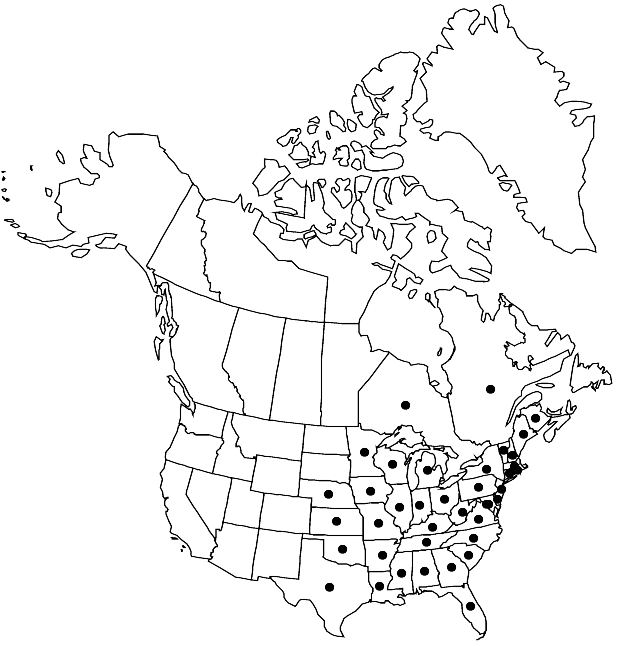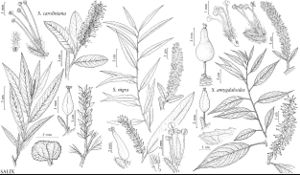Salix nigra
Arbust. Amer., 139. 1785.
Trees, 5–20+ m. Stems: branches highly brittle at base, redbrown to yellowbrown, glabrous; branchlets gray-brown to redbrown, glabrous or pilose to villous. Leaves: stipules rudimentary or foliaceous on early ones, usually foliaceous on late ones, (glands few or absent adaxially), apex acuminate, acute, or rounded; petiole (margins covering groove, with spherical glands distally), (2–) 3–10 (–15) mm, glabrous or pilose adaxially; largest medial blade (sometimes amphistomatous), very narrowly elliptic, lanceolate to narrowly lanceolate, or linear to lorate, (50–) 70–103 (–190) × (6–) 7.5–17 (–23) mm, 6–13 times as long as wide, base cuneate to convex, margins serrulate, apex acuminate, acute, or caudate, abaxial surface (not glaucous), glabrous or pilose, hairs white or ferruginous, wavy, adaxial slightly glossy, glabrous or pilose (especially on midribs); proximal blade margins serrulate; juvenile blade glabrous or pilose abaxially, hairs white and/or ferruginous. Catkins: staminate 35–83 × 7–13 mm, flowering branchlet 5–35 mm; pistillate 23–74 (–80 in fruit) × 5–10 mm, flowering branchlet 6–35 mm; floral bract 1–3 mm, apex acute or rounded, entire, abaxially sparsely hairy, hairs wavy; pistillate bract deciduous after flowering. Staminate flowers: abaxial nectary 0.3–1 mm, adaxial nectary oblong to ovate, 0.2–0.6 mm, nectaries distinct or connate and shallowly cupshaped; stamens 4–6; filaments hairy on proximal 1/2 or basally; anthers 0.4–0.6 mm, (axes strongly recurved). Pistillate flowers: adaxial nectary oblong, (swollen), 0.2–0.5 mm; stipe 0.5–1.5 mm; ovary pyriform to obclavate, (rarely pilose), beak slightly bulged below styles; ovules 12–16 per ovary; styles 0.1–0.3 mm; stigmas (sometimes 2 plump lobes), 0.2–0.28–0.36 mm. Capsules 3–5 mm. 2n = 38.
Phenology: Flowering (south) early Feb-early May, (north) late Mar-early Jul.
Habitat: Floodplains, edges of ponds and lakes, swamps, marshes, white cedar bogs, wet meadows, open fields, roadside ditches, mixed upland deciduous woods along streams
Elevation: 10-1400 m
Distribution

N.B., Ont., Que., Ala., Ark., Conn., Del., D.C., Fla., Ga., Ill., Ind., Iowa, Kans., Ky., La., Maine, Md., Mass., Mich., Minn., Miss., Mo., Nebr., N.H., N.J., N.Y., N.C., Ohio, Okla., Pa., R.I., S.C., Tenn., Tex., Vt., Va., W.Va., Wis., Mexico (Chihuahua)
Discussion
Hybrids:
Salix nigra forms natural hybrids with S. alba, S. amygdaloides, S. caroliniana, S. gooddingii, and S. lucida.
Selected References
None.
Lower Taxa
"-0.36mm" is not declared as a valid unit of measurement for this property.
